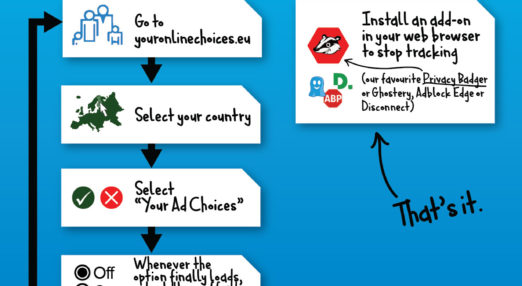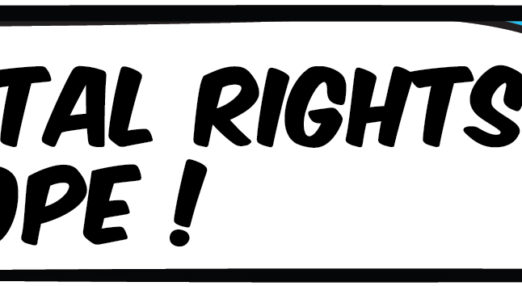Our work
EDRi is the biggest European network defending rights and freedoms online. We work to to challenge private and state actors who abuse their power to control or manipulate the public. We do so by advocating for robust and enforced laws, informing and mobilising people, promoting a healthy and accountable technology market, and building a movement of organisations and individuals committed to digital rights and freedoms in a connected world.
Filter resources
-

Facing a challenge – understanding Facebook’s opt-out instructions
Following Facebook’s new changes in its terms of service, the company has provided a public relations pitch about “your information” and how Facebook “respects the choices that you make” about the advertising that you see. In particular, it says “That’s why Facebook respects the choices you make about the ads you see, across every device. […]
Read more
-

Yet another internet blocking law in Turkey
This article is also available in: Deutsch: Neues Gesetz über Internetsperren in der Türkei In recent years, online censorship and the deteriorating situation regarding the freedom of speech has raised serious concerns in Turkey. The large majority of the traditional mainstream media is either directly or indirectly under the government control, and the Internet remains one […]
Read more
-

Stakeholders welcome the European Parliament’s Resolution in support of the Internet Governance Forum
We the undersigned, representing civil society and the Internet industry community in Europe: The need for renewal of the Internet Governance Forum’s mandate Welcome the European Parliament’s call for a renewal of the mandate of the Internet Governance Forum (IGF) and for the strengthening of its resources. Strongly support the call for the General Assembly of […]
Read more
-

How to deal with Facebook’s new tracking policies
If you use Facebook, you may have noticed that they have unilaterally changed the rules again about how they use your data. According to The Independent, the new change allows Facebook to gather data from activity across the internet, as well as the normal data it gathers on information you and your friends have added […]
Read more
-

NSA Whistleblower Bill Binney wins Sam Adams Award
Former technical director of the NSA turned whistleblower William “Bill” Binney, received the Sam Adams Award for Integrity in Intelligence on 22 January in a ceremony organised in Berlin, Germany. Sam Adams Associates for Integrity in Intelligence (SAAII) is a movement of former colleagues of a CIA intelligence analyst Sam Adams. SAAII grants its annual […]
Read more
-

French Patriot Act: Do we really need more surveillance?
On 21 January, only two weeks after the attacks in Paris, the French government announced a big bundle of new security measures, a “general mobilisation against terrorism”. But does the country need more surveillance? France has introduced telecommunications data retention for communications more than ten years ago, it has extensive video surveillance and intelligence services […]
Read more
-

EDRi launches privacy trainings in the European Parliament
On 23 January 2015, EDRi organised its first series of privacy and IT security training sessions in the European Parliament (EP). Three Members of the European Parliament (MEPs) and their assistants from throughout the political spectrum – European Conservatives and Reformists Group (ECR), European United Left, Nordic Green Left (GUE/NGL) and the Greens, European Free […]
Read more
-

Spanish Citizens’ Security Bill: Many restrictions, few freedoms
In summer 2014, the EDRi-gram reported on the Spanish bill on the Protection of Citizens’ Security, shedding light on some of its most controversial measures. In December 2014, the Spanish Congress passed the Citizens’ Security bill by 181 votes to 141. Now, the bill will be discussed in the Senate until the end of March […]
Read more
-

Data retention in Kosovo and Switzerland – legalising illegal laws
Less than a year ago, many thought data retention in Europe would finally be faced with incontrovertible evidence that it is not effective or proportionate. Now, sensing an opportunity to take advantage of a more favourable public relations landscape, some politicians seem to have the intention to bring EU data retention back again. Data retention […]
Read more
-

Did AGCOM censor an article about AGCOM censorship?
At the end of 2014, EDRi wrote an article on the Italian telecoms regulator AGCOM’s censorship procedures for the newsletter of the EU Observatory on Infringements of Intellectual Property Infringements. After agreeing to publish the article, the Observatory changed its mind – it has told us that it did so after it “felt obliged to […]
Read more
-

Icing on the cake: Romanian cybersecurity law unconstitutional
A cake: The Romanian cybersecurity law was declared unconstitutional on 21 January 2015. As previously reported in the EDRi-gram, EDRi member ApTI, together with 14 other NGOs filed an amicus curiae brief which provided the arguments against the constitutionality of this law. Icing on the cake- The Constitutional Court’s reasoning states that the cybersecurity law […]
Read more
-
Press release – Help us save the Internet!
Civil society, industry representatives and consumer groups join forces to appeal to ambassadors: Help us save the Internet! European Digital Rights (EDRi), together with other civil society organisations, consumer groups and industry representatives, sent today an open letter [pdf] to Member State Ambassadors to the European Union, reminding them of the importance of an open, […]
Read more
